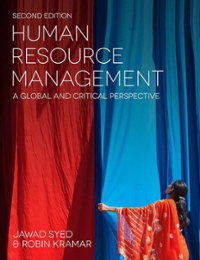Unhappy staff at Hyundai Australia have vented their frustration with management about their performance appraisal on Twitter.
Question:
Unhappy staff at Hyundai Australia have vented their frustration with management about their performance appraisal on Twitter. The boss of Hyundai Australia plans to confront staff and conduct 'an open discussion' about a barrage of negative comments on the social networking site Twitter. Hyundai Australia staff members have attacked the company's local boss on Twitter, complaining of unfair redundancies and stressful working conditions. In a year when the market contracted due to the global financial crisis, Hyundai bucked the trend, increasing sales almost 40 per cent. The Twitter comments claim morale is at a low ebb and that staff are overworked and underappreciated, with Korean employees favoured over locals. One comment says: II can tell you there are a lot of stressed employees who take their frustrations home with them. There are sleepless nights, health problems.' Another asks: 'How do you expect them to be productive, motivated and perform well under the current conditions?'
Mr Lee, the Managing Director admits ' / am very surprised' by the negative comments and will meet with staff to discuss their concerns. We are a growing company and we are doing very well: Most of all people are very happy.' He goes on to say 'I will meet our employees next Monday and I will have an open discussion about what is wrong and what is the concern. You could say I am a little concerned about this situation, but we are going forward so if there is any concern we can discuss. I am open minded, and this our open policy. He says 'staff concerns appear to be centred on a new performance appraisal system,' and he rejected claims that bonuses had not been properly paid.
I'd be happy to share some of my experiences managing Chinese staff. The staff in my office are probably qui different from staff in Chinese companies or government agencies, but 1 presume that the general themes are consistent.
A few points below:
- The majority of our Chinese locally engaged staff are university educated with a very high level of written and spoken English. While some of the staff have considerable experience in the office (between 10 and 20 years experience in the same office), some of the younger staff have lived and studied in English-speaking countric (Australia, UK, USA) or have previous work experience in other English-speaking environments (embassies o the private sector in business or hospitality).
- Hierarchy within the office is important - staff report to their team leaders, who in turn report to the office ma ager and then the expatriate managers. Unlike the Australian management style which can be quite egalitariz Chinese offices generally have a strict hierarchical structure - there is an overarching hierarchy in the office, and smaller team hierarchies, which align with work roles and responsibilities.
- There are often challenges with staff not using their initiative to solve problems or complete challenging tasks This is partly cultural, with some of the older staff preferring to be specifically tasked and diligently completin assigned tasks without question. Younger staff, particularly those with overseas experience, are generally \(\mathrm{mc}\) proactive in using their initiative or suggesting solutions to management. One strategy that has been developed in our office over many years by expatriate managers is encouraging staff to think about solutions to problems/challenges as they arise (taking responsibility for mistakes made) and encouraging self-initiative.
- Staff performance in our office is managed using Australian standard tools (performance agreements and reg lar discussions between staff and managers). Staff are accustomed to formal and informal discussions with their team leaders and the expatriate managers - these discussions are an opportunity for staff and managers to comment on performance and discuss development opportunities and determine a performance ratinc which is linked to an annual performance bonus.
Questions
1 How would you describe the management of human resource function in this office?
2 Who is the best person to manage the performance appraisals of the Chinese staff?
3 What challenges may the Australian expatriate manager experience in conducting performance appraisal wi Chinese employees?
4 Who is the ideal person to perform the Australian manager's appraisal?
5 What do you consider are the challenges in setting up a 360 -degree feedback process in the office?
Step by Step Answer:

Human Resource Management A Global And Critical Perspective
ISBN: 9781137521620
2nd Edition
Authors: Jawad Syed, J; Kramar Syed, Robin Kramar





